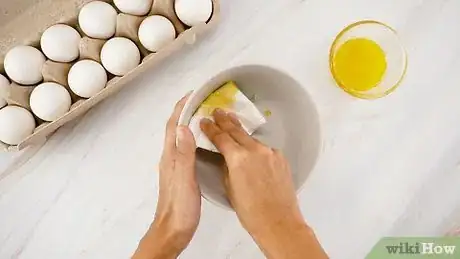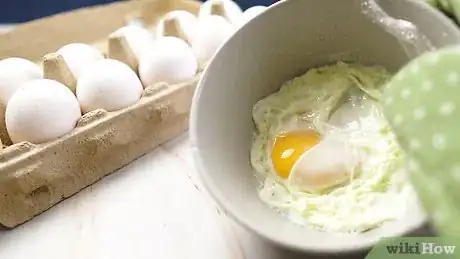This article was co-authored by wikiHow staff writer, Hannah Madden. Hannah Madden is a writer, editor, and artist currently living in Portland, Oregon. In 2018, she graduated from Portland State University with a B.S. in Environmental Studies. Hannah enjoys writing articles about conservation, sustainability, and eco-friendly products. When she isn’t writing, you can find Hannah working on hand embroidery projects and listening to music.
The wikiHow Video Team also followed the article's instructions and verified that they work.
This article has been viewed 2,173,870 times.
Learn more...
If you're craving a hard boiled egg but you don't have access to a stovetop, you might think you're out of luck. However, if you have a microwave and a bowl, you can make a few quick and easy hard boiled eggs in just a couple of minutes. Always crack the eggs and pop the yolk before you microwave them to prevent an explosion, and never microwave an egg that’s already been hard boiled.[1]
Steps
Cracking and Covering the Egg
-
1Grease a microwave-safe bowl with butter. Rub the inside of a small, microwave-safe bowl with butter using a paper towel. Custard ramekins work well if you are only cooking 1 egg, but you can use any size container.[2]
- You can also use olive oil spray instead of butter.
-
2Sprinkle 1/2 tsp (2.5 g) of salt into the bowl. You don’t have to be super accurate with your measurements of salt, but try to use enough to cover the bottom surface of your container. Salt will help the egg cook evenly, and may give it some more flavor.[3]
- You can put more salt on the egg after it’s cooked if you’d like to.
Advertisement -
3Crack the egg into the bowl. Tap the side of the egg onto the side of the bowl, then pull open the shell. Let the egg white and the yolk fall into the bowl, being careful not to include any of the shell.[4]
- You can cook more than 1 egg at a time, but it may not cook as evenly.
-
4Pierce the egg yolks with a knife or a fork. Even the thin membrane holding the yolk together will build up pressure as the moisture inside heats up, which can lead to an exploding egg. Prevent this by piercing each yolk with the tip of a knife, skewer, or fork 3 to 4 times each.[5]
Warning: It is super important that you pierce the yolk before you put the eggs in the microwave. If you don’t, the hot eggs could explode on you and cause serious injury.
-
5Cover the bowl with plastic wrap. Rip off a piece of plastic wrap that’s slightly larger than your bowl, then stick it down to the edges so that no heat can escape. This will help trap in the steam that the egg makes when it’s hot so that it cooks faster.[6]
- Never use aluminum foil in the microwave, or you could start a fire.
Cooking the Egg
-
1Microwave the egg for 30 seconds at 400 watts. If you can adjust the power setting on your microwave, turn it to medium or low. Your egg may need more time in the microwave, but it’s better to start low and slow to avoid any explosions.[7]
- If you can’t adjust the settings on your microwave, just assume it’s on high and microwave your egg for 20 seconds instead of 30. It’s better to undercook your egg at first so you can fix it later.
-
2Put the egg back in for 10 seconds if it’s undercooked. Check the yolk on your egg to see if it’s hard. If it’s still too soft, put it back in the microwave on low or medium power for about 10 seconds. Try not to cook it for much longer than that, or it could get too hot.[8]
- A cooked egg will have white, not clear, egg whites and a firm orange yolk.
-
3Wait 30 seconds before unwrapping your egg. The egg will still cook inside the bowl after you take it out of the microwave. Make sure the egg whites are set and the yolk is hard before you start eating your egg.[9]
Warning: Use caution when you dig into your egg, because it will probably be super hot.
Community Q&A
-
QuestionCan I put the egg in the microwave without the plastic wrap?
 wikiHow Staff EditorThis answer was written by one of our trained team of researchers who validated it for accuracy and comprehensiveness.
wikiHow Staff EditorThis answer was written by one of our trained team of researchers who validated it for accuracy and comprehensiveness.
Staff Answer wikiHow Staff EditorStaff AnswerThe plastic wrap helps to trap the steam in which will cook the egg faster and more evenly. If you don't use it, your egg probably won't get cooked all the way through.
wikiHow Staff EditorStaff AnswerThe plastic wrap helps to trap the steam in which will cook the egg faster and more evenly. If you don't use it, your egg probably won't get cooked all the way through. -
QuestionWhy did they burst in the bowl?
 Community AnswerIt was due to internal pressure from the liquid inside being steamed. Microwave them at 50% power and poke a tiny hole in the bottom of the shell.
Community AnswerIt was due to internal pressure from the liquid inside being steamed. Microwave them at 50% power and poke a tiny hole in the bottom of the shell. -
QuestionWhy did the egg yolks turn brown and eggs smell funny when I boiled them in the microwave 5 minutes at level 5 temperature?
 Community AnswerThey shouldn't turn out like that. You either have a more powerful microwave than most people and your eggs were overcooked or you were using expired eggs.
Community AnswerThey shouldn't turn out like that. You either have a more powerful microwave than most people and your eggs were overcooked or you were using expired eggs.
Warnings
Things You'll Need
- Microwave-safe bowl
- Paper towel
- Knife or fork
- Plastic wrap
References
- ↑ https://www.incredibleegg.org/cooking-school/tips-tricks/microwave-wisdom/
- ↑ https://whatscookingamerica.net/Eggs/MicrowaveEggs.htm
- ↑ https://eggs.ab.ca/recipes/basic-microwaved-eggs/
- ↑ https://eggs.ab.ca/recipes/basic-microwaved-eggs/
- ↑ https://whatscookingamerica.net/Eggs/MicrowaveEggs.htm
- ↑ https://whatscookingamerica.net/Eggs/MicrowaveEggs.htm
- ↑ https://whatscookingamerica.net/Eggs/MicrowaveEggs.htm
- ↑ https://eggs.ab.ca/recipes/basic-microwaved-eggs/
- ↑ https://whatscookingamerica.net/Eggs/MicrowaveEggs.htm
About This Article
To cook an egg in the microwave, first grease the inside of a microwave-safe bowl with butter or oil. Sprinkle ½ teaspoon (3 g) of salt over the bottom of the bowl to help the egg cook evenly and give it more flavor. Then, crack an egg into the bowl, and pierce the yolk with a knife so it doesn’t explode in the microwave. Never hardboil a whole egg in the microwave since it can explode and make a mess. Cover the bowl with plastic wrap, then microwave it for 30 seconds on low heat. Continue microwaving it for 10 seconds at a time until it’s cooked through. Finally, remove it and let it sit for 30 seconds before serving it. For tips on how to hardball eggs in the microwave without the shell, read on!






















































